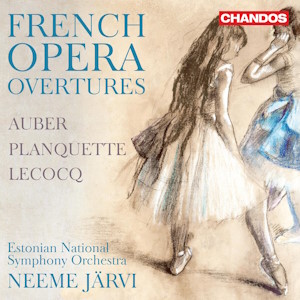
French Opera Overtures
Daniel François-Esprit Auber (1782-1871)
Le Domino noir (1837)
La Muette de Portici (1828)
Les Diamants de la Couronne (1841)
Jean Robert Planquette (1848-1903)
Les Cloches de Corneville (1877)
Alexandre Charles Lecocq (1832-1918)
La Fille de Madame Angot (1918)
Ballet suite Mam’zelle Angot (arr. by Gordon Jacob, 1947)
Estonian National Symphony Orchestra/Neeme Järvi
rec. 2022, Estonia Concert Hall, Tallinn
Chandos CHAN20318 [68]
This is a delightful disc in many respects and although it introduces us to some of the highly charming French overtures already available on CD, it carries one distinct bonus: the inclusion of the opéra comique, La Fille de Madame Angot, not just its overture, but also an orchestral suite of its vocal numbers. The numbers were arranged for a Sadler’s Wells ballet featuring Margot Fonteyn in 1947. The delightful arrangements by Gordon Jacob are superb and are well performed by Järvi and his Estonian orchestra, having good tempi and excellent musicianship. Jacob, I notice, has shortened the overture yet has retained all its main elements. The catchy melody lines of the dance numbers and their lively orchestration are a delight. It is a pity that the spaces between the dances have unexpectedly long track pauses because this causes the listener to lose momentum in mental continuity. Lecocq should be a better known composer today, as his output was extensive and he was well tutored at the Paris Conservatoire by Halévy. He came after the Offenbach heyday so it’s no surprise that his compositions are a similar, although Offenbach is better remembered.
Le Domino noir is a delightful early opéra comique and is one of Auber’s best, having played for 1,207 performances during its opening run in Paris. Its overture is particularly memorable for its charming melodies and structure, which are done justice to in this recording. Planquette’s Les Cloches de Corneville is an impressive composition with brightness and a nice valse melody line. Strangely, a silent bar that comes after 8 and 16 bars in the opening is lengthened for no apparent reason and the ending chord is held interminably. Neither of these effects bring any benefit to the overture, so why introduce them?
La Muette de Portici overture is the odd one out to this collection of opéra comique, as it borders on Grand Opera with melodramatic overtones, a background of revolution, and an eruption of Mount Vesuvius as part of its action. Auber composed a good overture for the opera with good dramatic sections. This is a lovely performance on the Chandos disc that brings out the best in the score. I find Järvi enthusiastically sensitive to the dynamics and nuances of the piece.
Two other versions of Les Diamants de la Couronne overture are reviewed on MusicWeb-International (review ~ review) and this is perhaps the least of my favourites for three reasons: I find the pace uncomfortably fast, the pizzicato sections are not particularly well defined, and the forte brass chords heavily punctuate the delicacy of the piece. Because the playing is rushed, some of the filigree of the music is lost and at times the first strings are noticeably recessed and so are easily drowned by the brass. In fact the ff dynamic is read as fff and rather masks the rhythm.
The recording ambience here is elegant and the woodwind are nicely captured. Roger Nichols provides interesting notes in English, German and French. Perhaps I would have welcomed more expansion on some of the detail given as there was plenty of space in the booklet (three pages are devoted to advertising and three more used for full-page images of Neeme Järvi).
Raymond J Walker
Buying this recording via a link below generates revenue for MWI, which helps the site remain free



















